


编辑:LY-Temple 日期:2014-03-25 16:46
Lingyin organised an animal-freeing ceremony on Shākyamuni Buddha’s Leaving Home Day to pray for the victims of Kunming terrorist attack.
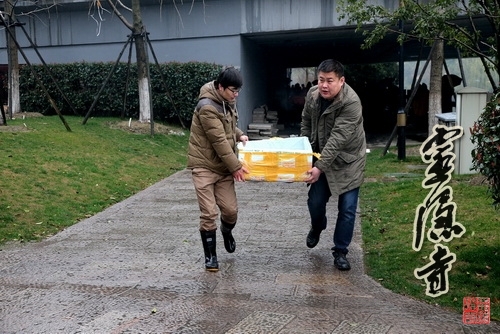
Carefully moving the purchased animals to the vehicles for later releasing ceremony
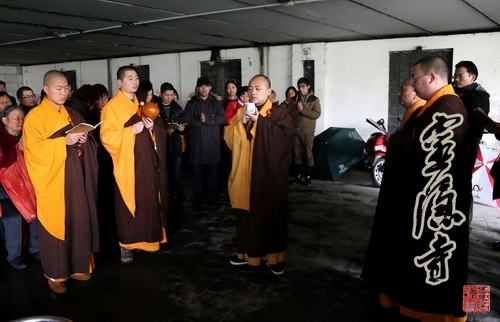
Venerables preached Dharma and conducting ceremony of refuge in the Triple Jewel for the souls to be released
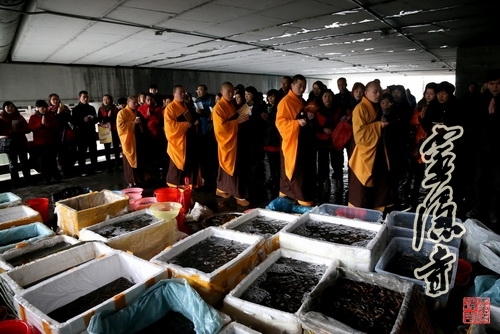
Volunteers praying for all sentients following the lead of venerables
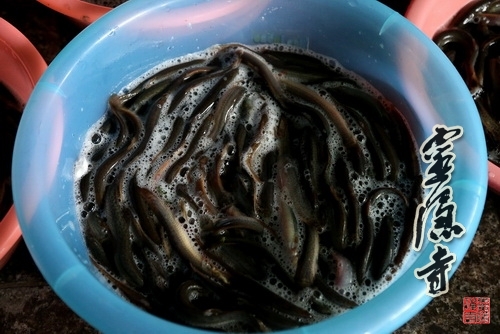

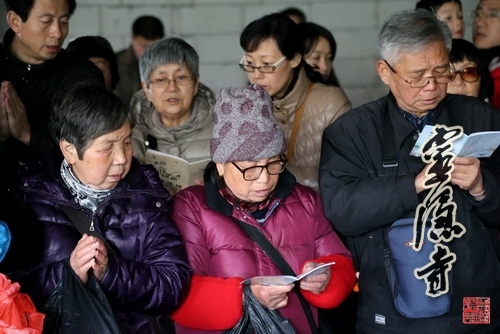
volunteers and lay believers praying for the deceased and injured victims of Kunming terrorist attack
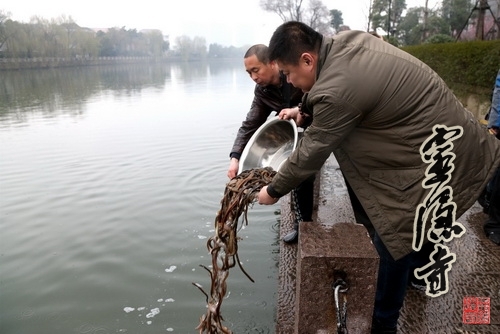
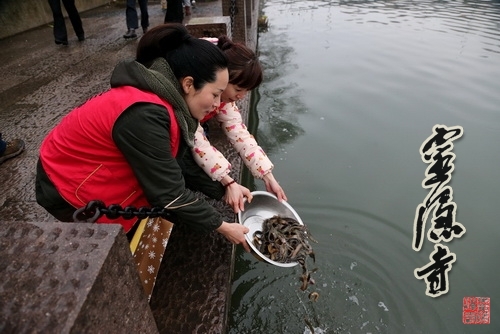
Obtaining merit by freeing living creatures in person and the joy of hearing the dharma with fellow Buddhists
The 8th of March, 2014, or the eighth of February in Chinese solilunar calendar, is the anniversary of the day when ?ākyamuni left home to become a monk. To commemorate this event, Lingyin Temple organised a large animal-freeing ceremony on the bank of Qiantang River. The ceremony also included praying rituals for the deceased and injured victims in the recent terrorist attacked in Kunming which happened on the first of March. Over two hundred volunteers, believers and local residents voluntarily attended the ceremony and shared the Buddhist merit.
At three o’clock in the morning, when most of the people were still in their dreams, volunteers of the Yunlin Volunteer Group who were in charge of the purchase of captive animals were already on their way to the wholesale fish market in the February drizzle.
Volunteers blended themselves in the busy market and started the bargain as soon as they arrived, to make sure that the fishes to be freed remain alive, and to save as many lives as possible with available funds. Following a list, volunteers went from stall to stall to look for the animals that they planned to release. Loaches were the first living creatures to be weighed and carried to the Temple’s trucks. After two hours of hard work, ricefield eels which easily survive and settle in the canal, and river snails which are beneficial for the water quality of the river, found their way to the truck too. At half past six, the fully loaded truck headed for the venue of the freeing ceremony. Around half past nine, the freeing ceremony began as planned in the spring rain. "Surrender to the Buddha, surrender to the dharma, surrender to the sangha!""Save all living beings without limit; put an end to all passions and delusions however numerous; study and learn all methods and means without end; become perfect in the supreme Buddha-law!"The venerables performed the freeing rituals following the rules, and walked around to spray the holy water. Faithful believers, with their palms closed, followed the venerables’ lead and recited the three surrenders and four vows to the living creatures that
were to be freed. All made the wish that they should save all animated and inanimated creatures in the world with the an enlightened mind of Bodhi.
After the freeing rituals, participants used pots, buckets and trolleys to returned the ricefield eels, soft shell turtles, crucian carps, river snails and other living creatures from the water back to nature, creating a most touching scene. This animal-freeing and praying event organised by Lingyin Temple on Buddha’s Leaving Home Day aimed to free animals following scientific principles, and thereby encourage and raise the awareness of environmental protection in the general public. The ceremony was also intended to be educational to the public about the meanings behind animal freeing and the importance of cherishing lives. It was the hope of the organiser that the merit obtained from the animal-freeing ceremony could be used for the victims of the Kunming terrorist attack on the first of March, to pray for restful souls for the deceased, for the strength of the survived, for the harmony for the society and for world peace.
●Info sheet: ?ākyamuni Buddha’s Leaving Home Day
It is generally agreed among Chinese Buddhists that the fifteenth of February of Chinese solilunar calendar is Mahāparinirvā?a (Nirvana) Day of the Buddha, the eighth of April ?ākyamuni Buddha's birthday (Vesak) and the eighth of December is Buddha’s Enlightenment Day. The leaving home day of ?ākyamuni Buddha's was recorded in The Records of the Transmission of the Lamp from Jingde period (1004-1007AD), which, in turn, summarised the life of the Buddha according to Lalitavistara Sūtra. The ?ākyamuni Buddha, was born in a royal family in Kshatriya cast on the eighth of April in the twenty-fourth year of the reign of King Zhao of Zhou Dynasty. When he was born, "A pure light beautifies everything, glowing golden; Hundreds of fine instruments resound from the empty sky without being played...From the solid earth sprung beautiful lotuses, the nature of vajra; They appeared auspiciously where the Guide placed his wheel-marked feet. ...With the gait of a lion, he took seven steps and, undistracted, spoke with the voice of Brahmā:‘I am the most excellent in the world.’". On the eighth of February in the twenty-fourth year of the reign of King Zhao of Zhou Dynasty, he reached nineteen years of age and would like to leave home. He asked himself: "What do I see in the world?"He set out to the royal pleasure garden, and had four encounters (with an old man, a sick man, a dead man with grieving families and a monk) and sympathized with the suffering and grief of the people he met. He thought, however, that he should eventually free himself from aging, sickness and death. That night, a heavenly being named Jingju descended to the window of the prince, and said to him with crossed arms:"It is time; you can go!"With great pleasure, the prince left his city, and lived as a monk in Mount Pandava. The eighth of February was therefore taken by later Buddhist to be the day of ?ākyamuni Buddha's leaving home, an event often commemorated with relevant rituals and ceremonies .